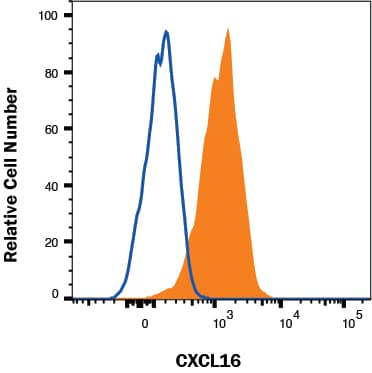Mouse CXCL16 Biotinylated Antibody Summary
Asn27-Pro114
Accession # Q8BSU2
Applications
Mouse CXCL16 Sandwich Immunoassay
Please Note: Optimal dilutions should be determined by each laboratory for each application. General Protocols are available in the Technical Information section on our website.
Scientific Data
 View Larger
View Larger
Detection of CXCL16 in Raw 264.7 cells by Flow Cytometry Raw 264.7 cells were stained with Goat Anti-Mouse CXCL16 Biotinylated Antigen Affinity-purified Polyclonal Antibody (Catalog # baf503, filled histogram) or isotype control antibody (Catalog # BAF108, open histogram) followed by Streptavidin-Allophycocyanin (Catalog # F0050). View our protocol for Staining Membrane-associated Proteins.
Reconstitution Calculator
Preparation and Storage
- 12 months from date of receipt, -20 to -70 °C as supplied.
- 1 month, 2 to 8 °C under sterile conditions after reconstitution.
- 6 months, -20 to -70 °C under sterile conditions after reconstitution.
Background: CXCL16
Mouse CXCL16 (CXC chemokine 16) is a non-ELR motif-containing CXC chemokine with a transmembrane domain. CX3CL1/Fractalkine and CXCL16 are the only two transmembrane chemokines within the superfamily. Mouse CXCL16 cDNA encodes a 246 amino acid (aa) precursor protein with a putative 26 aa residue signal peptide, an 88 aa residue chemokine domain, an 87 aa residue mucin-like spacer region, a 22 aa residue transmembrane domain, and a 23 aa residue cytoplasmic tail. Mouse and human CXCL16 share 49% overall aa identity and 70% similarity in the chemokine domains. Mouse CXCL16 is produced by dendritic cells in lymphoid organ T cell zones and by cells in the splenic red pulp both as membrane-bound and soluble forms. Based on northern blot analysis, CXCL16 is also expressed in some nonlymphoid tissues such as lung, small intestine and kidney. The receptor for CXCL16 has been identified as CXCR6/Bonzo (STRL33 and TYMSTR), a receptor previously shown to be a co-receptor for HIV entry. CXCR6 is expressed on naive CD8 cells, natural killer T cells and activated CD8 and CD4 T cells.
Product Datasheets
Citations for Mouse CXCL16 Biotinylated Antibody
R&D Systems personnel manually curate a database that contains references using R&D Systems products. The data collected includes not only links to publications in PubMed, but also provides information about sample types, species, and experimental conditions.
6
Citations: Showing 1 - 6
Filter your results:
Filter by:
-
Leishmania donovani lipophosphoglycan increases macrophage-dependent chemotaxis of CXCR6-expressing cells via CXCL16 induction
Authors: V Chaparro, LP Leroux, A Zimmermann, A Jardim, B Johnston, A Descoteaux, M Jaramillo
Infect. Immun., 2019-04-23;0(0):.
-
Evidence for a multipotent mammary progenitor with pregnancy-specific activity
Authors: Alice S Kaanta, Carl Virtanen, Laura M Selfors, Joan S Brugge, Benjamin G Neel
Breast Cancer Research
Species: Mouse
Sample Types: Whole Cells
Applications: Flow Cytometry -
Response patterns of cytokines/chemokines in two murine strains after irradiation.
Authors: Zhang M, Yin L, Zhang K, Sun W, Yang S, Zhang B, Salzman P, Wang W, Liu C, Vidyasagar S, Zhang L, Ju S, Okunieff P, Zhang L
Cytokine, 2012-01-25;58(2):169-77.
Species: Mouse
Sample Types: Plasma
Applications: Luminex Development -
Targeted disruption of the scavenger receptor and chemokine CXCL16 accelerates atherosclerosis.
Authors: Aslanian AM, Charo IF
Circulation, 2006-07-31;114(6):583-90.
Species: Human
Sample Types: Whole Tissue
Applications: IHC-Fr -
A distinct and unique transcriptional program expressed by tumor-associated macrophages (defective NF-kappaB and enhanced IRF-3/STAT1 activation).
Authors: Biswas SK, Gangi L, Paul S, Schioppa T, Saccani A, Sironi M, Bottazzi B, Doni A, Vincenzo B, Pasqualini F, Vago L, Nebuloni M, Mantovani A, Sica A
Blood, 2005-11-03;107(5):2112-22.
Species: Mouse
Sample Types: Whole Tissue
Applications: IHC -
A disintegrin and metalloproteinase 10-mediated cleavage and shedding regulates the cell surface expression of CXC chemokine ligand 16.
Authors: Gough PJ, Garton KJ, Wille PT, Rychlewski M, Dempsey PJ, Raines EW
J. Immunol., 2004-03-15;172(6):3678-85.
Species: Mouse
Sample Types: Cell Culture Supernates
Applications: ELISA Development
FAQs
No product specific FAQs exist for this product, however you may
View all Antibody FAQsReviews for Mouse CXCL16 Biotinylated Antibody
There are currently no reviews for this product. Be the first to review Mouse CXCL16 Biotinylated Antibody and earn rewards!
Have you used Mouse CXCL16 Biotinylated Antibody?
Submit a review and receive an Amazon gift card.
$25/€18/£15/$25CAN/¥75 Yuan/¥2500 Yen for a review with an image
$10/€7/£6/$10 CAD/¥70 Yuan/¥1110 Yen for a review without an image

